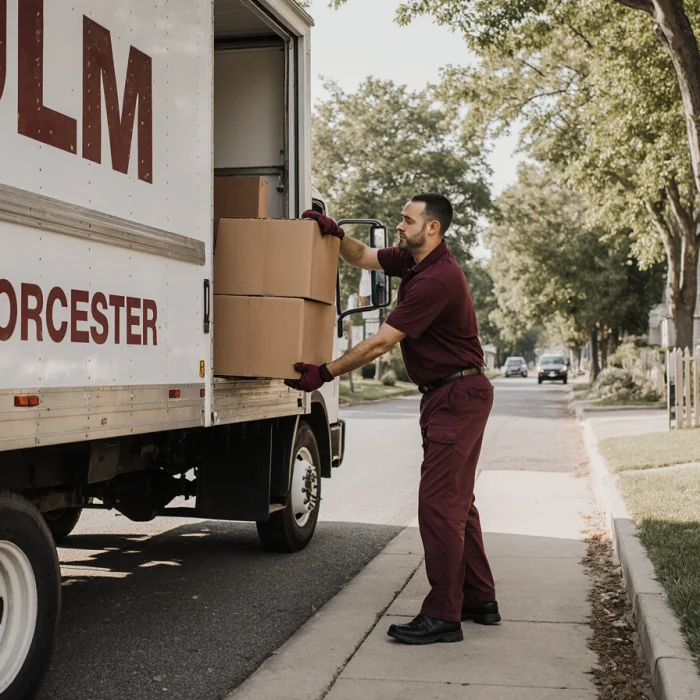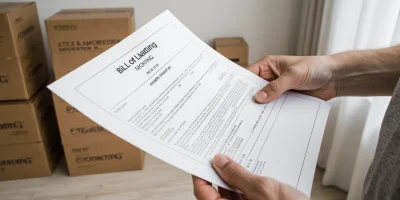Home > Interstate Moving > Moving to Massachusetts > Moving to Worcester
Moving to Worcester
Worcester, Massachusetts, often called the “Heart of the Commonwealth,” is the second-largest city in New England with a population of about 205,000. Centrally located between Boston and Springfield, Worcester has evolved from its industrial roots into a modern hub for healthcare, education, and biotechnology. Known for its affordability compared to Boston, its diverse neighborhoods, and strong academic institutions, Worcester attracts families, students, professionals, and retirees. With its balance of cultural offerings, green spaces, and career opportunities, the city has become a leading relocation choice in Massachusetts.

Why More People Are Moving from Other States to Worcester
Worcester attracts people leaving high-cost cities like Boston, New York, and San Francisco. Families are drawn to its affordable housing, reputable schools, and strong healthcare systems. Students come for the city’s many universities and colleges, while professionals benefit from growing biotech and healthcare sectors. Retirees appreciate the lower cost of living compared to Boston, as well as Worcester’s access to cultural amenities, parks, and medical services. Its central location in Massachusetts makes it convenient for those who want access to major metropolitan areas without the same level of expense.
Pros of Living in Worcester
Worcester’s biggest strengths are its affordability, location, and cultural vibrancy. Housing is significantly more affordable than Boston, while still offering access to big-city amenities. The city has ten colleges and universities, creating a youthful, intellectual energy. Worcester offers diverse dining options, thriving arts and music scenes, and numerous festivals. Green spaces like Elm Park and Green Hill Park provide outdoor recreation, while access to nearby lakes and mountains is easy. Healthcare is top-tier, with UMass Memorial Medical Center serving as a major regional provider.

Ready to get moved? Get a FREE quote now
Book your move easily and stress-free!
Cons of Living in Worcester
Worcester does have challenges. Winters are long and snowy, which can be tough for some residents. Public transportation is limited compared to Boston, meaning most residents need a car. Certain neighborhoods face higher crime rates and economic struggles. While revitalization has improved downtown, parts of the city are still developing. Job opportunities are expanding, but they may not be as plentiful as in Boston or Cambridge.

What Life is Like in Worcester
Life in Worcester is balanced and community-driven. Families enjoy schools, local events, and access to parks. Retirees appreciate affordable housing and healthcare. Students contribute to a lively, youthful atmosphere with cultural activities and nightlife. Daily life may include attending concerts at the DCU Center, enjoying dining along Shrewsbury Street, or exploring local museums. Worcester combines the feel of a mid-sized city with the amenities of a larger metro area.
Living Costs in Worcester
| Category | Worcester | National Average |
|---|---|---|
| Housing (Rent per Month) | $1,700 | $1,570 |
| Utilities | $185 | $180 |
| Groceries | $340 | $330 |
| Transportation | $160 | $140 |
| Healthcare | $455 | $440 |
Worcester’s costs are above the national average but much lower than Boston, making it an affordable New England relocation option.

Ready to get moved? Get a FREE quote now
Ready to get moved? Get a FREE quote now
Schools and Education in Worcester
Worcester is a strong academic center, home to ten colleges and universities, including Worcester Polytechnic Institute (WPI), Clark University, and College of the Holy Cross. Public schools are part of Worcester Public Schools, serving a diverse student population. Charter and private schools add to the options for families. The concentration of higher education institutions gives Worcester a unique academic and cultural character.
Transportation and Getting Around
Worcester is served by MBTA commuter rail to Boston, making it possible for residents to commute. Interstate highways connect the city to Boston, Springfield, and Providence. Public bus service is available through the Worcester Regional Transit Authority, though most residents rely on cars. Worcester Regional Airport offers some commercial flights, while Logan International Airport is about an hour away.

United Local Movers: Our Services
Relocating to Worcester is stress-free with United Local Movers. We provide professional services including local moves, long-distance relocations, full packing services, and secure storage. Our experienced team understands New England relocations and ensures reliable service. With transparent pricing and customer-first care, United Local Movers makes moving to Worcester seamless.
Average Cost to Move to Worcester
| Move Type | Estimated Cost |
|---|---|
| Local Move (1-2 Bedrooms) | $1,300–$2,200 |
| Cross-Country Move | $4,700–$8,100 |
| Full Packing Services | + $400–$950 |
| Storage Options | $170–$340 per month |
Moving costs to Worcester are lower than Boston, making it attractive for those seeking affordability in New England.


How to Choose the Right Moving Company
When relocating to Worcester, choose a moving company with experience in New England moves. Look for movers that are licensed, insured, and transparent with pricing. Strong reviews and services like packing and storage can make the process smoother. United Local Movers provides all these features, ensuring your move to Worcester is efficient, affordable, and stress-free.
Final Thoughts
Worcester, Massachusetts, offers affordability, strong education, and cultural vibrancy in the heart of New England. While winters are long and some areas face economic challenges, its location, healthcare, and universities make it appealing for families, professionals, and retirees. With United Local Movers as your trusted partner, your move to Worcester will be smooth, reliable, and the beginning of a rewarding new chapter in the Heart of the Commonwealth.





